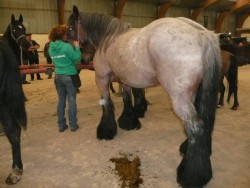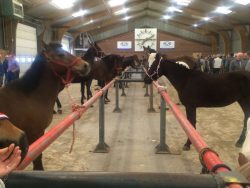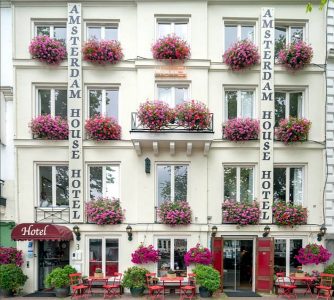Two EonA inspectors went to the horse market in Barneveld, which takes place weekly on Monday mornings. This horse market is only intended for the trade in horses and has no activities such as a fair or amusement park attached. The duration is limited: from 07:00-12:00hrs. This morning about 75 horses and ponies were counted.
Between 06:00 and 07:00hrs the trailers arrive and from 07:00hrs onwards a veterinarian is posted at the market hall. It is positive that there is only one small entrance to the market site; so the horses must be led one by one along the vet. However, this check is certainly not a thorough one. However, it was evident that the condition of the horses was generally good. We saw no skinny horses or lame horses and all hooves were in acceptable condition. One pony showed an advanced stage of a skin disease, presumably contagious ringworm, and was sold directly for slaughter outside the market hall. One old Frisian horse was in good condition but had a tumor or abscess.
Two ponies still had large plucks of winter fur; a sign that they came from a stable or pasture where they had not received proper care. The rest of the equines however looked as if they came from places where they had been well cared for. Barneveld has a reputation that horses there will be sold “for slaughter”, yet still a considerable number of horses were seen and marketed as a riding or breeding horse. There was also a Belgian draft horse present: we were very happy to see that this one’s tail had not been docked.
Stallions are kept outside, separate from the other horses. The horses were handled, loaded and unloaded quietly. We saw one truck with a ramp that was missing the mandatory lateral protectors; the rest of the trucks did have these and the bigger ones also had dividers.
The horses in the market hall has sufficient space. On the floor lay a little sawdust: given the quiet atmosphere this was now sufficient to prevent slipping. However, the horses were not offered hay or water. For horses that are there longer periods of time, this should be offered. Most horses are traded within the Netherlands. The exports auditors of the NVWA arrived around 10.30am. There were some German and Belgian traders and there was a big truck coming from Poland.
Eyes on Animals spoke to Rinus Bakker of the Dutch League for Horse Traders, who is present every Monday at the market in Barneveld. We said EonA is satisfied with the level of welfare. It is a much more calm and less stressful environment for the horses compared to the ones who are traded on the major Dutch “festive” horse markets held in the fall. The limited time-period and the absence of stress stimuli such as thousands of (drunk) visitors, (fun) fairs and pubs make this a much more appropriate trading facility for horses.
However, we see that even in Barneveld, structural entry control and registration of horses present is lacking and that it is possible to avoid veterinary control if one does not present his horses in the hall. Rinus Bakker responded that there is social control “because people know each other and call each other into account for certain behavior”. We have been contacted once by an individual who claims here 2 ponies were unrightfully traded at Barneveld. Also, a few horses were present whose tail hair had been cut off – a sign that they had been in a slaughterhouse previously. EonA will discuss these issues more profoundly in the inspection report.
The Eyes on Animals inspectors could take photos and videos unhindered. Initially, some horse dealers tried to discourage this and comments were made along the lines that “they would like to beat us”, but fortunately we could exercise our normal inspection work.
Later EonA tried to go on an (unannounced) inspection at Slaughterhouse Henk Worst in Nijkerk. Horses purchased on the market in Barneveld are often offered at this slaughterhouse on Mondays, including those meant for German horse meat consumption. However, we unfortunately were not let in.
We are welcomed to take a look at horse slaughterhouse Van Veen, also in Nijkerk. We will go there on an inspection on a Friday, which is the ‘slaughter day’. Here, mainly horses from private individuals are slaughtered.
Watch a video impression of the market HERE.



